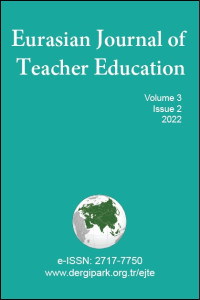Eğitimde Edmodo Kullanımına Yönelik Öğretmen Adaylarının Tutumları
Öğretmen adayları, Eğitim, Edmodo, Sanal sınıf, Tutum
Attitudes of Pre-Service Teachers for Edmodo Use in Education
Pre-service teachers, Education, Edmodo, Virtual classroom, Attitude,
___
- Alemdağ, E. (2013). Edmodo: Eğitsel bir çevrimiçi sosyal öğrenme ortamı. İnetTr’13, XVIII. Türkiye'de İnternet Konferansı 18.cilt (71-77). İstanbul Üniversitesi. http://inet-tr.org.tr/inetconf18/bildiri/28.pdf [Erişim Tarihi: 04.01.2020].
- Aycock, B., K., Jaykumar, V., L. & N. Fukey. (2014). A study on student preference towards the use of Edmodo as a learning platform to create responsible learning environment. Procedia – Social and Behavioral Sciences, 144(20), 416–422. DOI:10.1016/j. sbspro.2014.07.311
- Büyüköztürk, Ş., Çakmak, K, E., Akgün, E, Ö., Karadeniz, Ş. ve Demirel, F. (2018). Eğitimde bilimsel araştırma yöntemleri. Ankara: Pegem A Yayıncılık.
- Centre for Learning & Performance Technologies (2016). Top 100 Tools for Learning 2015. http://c4lpt.co.uk/top100tools/ [Erişim Tarihi: 12.10.2019].
- Christensen, L. B., Johnson, R. B., & Turner, L. A. (2014). Research methods design and analysis. Pearson Education, Inc.
- Durak, G., Çankaya, S. ve Yünkül, E. (2014). Eğitimde eğitsel sosyal ağ sitelerinin kullanımı: Edmodo örneği. Dumlupınar Üniversitesi Sosyal Bilimler Dergisi, 41.
- Ekici, D. İ. (2017). The use of Edmodo In creating an online learning community of practice for learning to teach science. Malaysian Online Journal of Educational Sciences, 5(2), 91-106.
- Enriquez, M. A. (2014). Students’ perceptions on the effectiveness of the use of Edmodo as a supplementary tool for learning. Presented at the DLSU Research Congress. Manila, Philippines: De La Salle University.
- Fraenkel, J. R., Wallen, N. E. & Hyun, H. H. (2012). How to design and evaluate research in education. (8th Ed.). McGraw-Hill, New York.
- Hamutoğlu, N., B. ve Kıyıcı, M. (2017). Bir eğitsel sosyal ağ olarak Edmodo’nun yükseköğretimde kullanımına yönelik öğrenci görüşlerinin incelenmesi. Trakya Üniversitesi Eğitim Fakültesi Dergisi, 7(2), 322-343. DOI: 10.24315/trkefd.290573
- Jarc, J. (2010). Edmodo-a free, web2.0 classroom management tool. http://trendingeducation.com/?p=190 [Erişim Tarihi: 05.02.2020].
- Jones, J., S. & Rice, M., L. (2017). Exploring classroom microblogs to improve writing of middle school students. Journal of Interactive Online Learning, 15(1), 26-41.
- Kazez, H. ve Bahçeci, F. (2016). Böte bölümü öğretmen adaylarının Edmodo kullanımına diar görüşlerinin incelenmesi. Eğitim ve Öğretim Araştırmaları Dergisi, 5(1), 9-20.
- Kuzgun, H. ve Özdinç, H. (2017). Eğitsel sosyal ağ ortamı Edmodo’nun kullanılabilirliğinin incelenmesi. AKU Kuramsal Eğitimbilim Dergisi, 10, 2, 274-297.
- Ma’azi, H. ve Janfeshan, K. (2018). The effect of Edmodo social learning network on Iranian EFL learners writing skill, Cogent Education, 5(1). DOI: 10.1080/2331186X.2018.1536312
- Mahajan, P. (2009). Use of social networking in a linguistically and culturally rich India. The International Information & Library Review, 41, 129-136.
- Kongchan, C. (2012). How a non-digital-native teacher makes use of Edmodo. ICT for Language Learning.
- Nee, C. K. 2014. The effect of educational networking on students’ performance in Biology.” International Journal on Integrating Technology in Education (IJITE) 3(1): 21– 41. DOI: 10.5121/ijite.2014.3102
- Neuman, L, W. (2004). Social research methods: Qualitative and quantitative approaches. (7th Ed.). London: Pearson Education Limited.
- Prensky, M. (2001). Digital natives, digital immigrants part 1. (R. K. Belew ve M. D. Vose, Eds.) On the Horizon, 9(5), 1–6. DOI: 10.1108/10748120110424816
- Rogers, A. (2011). Using Edmodo to extend literacy learning: Grade 6 novel study. Learning, Literacies, & Libraries, 4(1), 28.
- Sanders, K. S. S. (2012). An examination of the academic networking site Edmodo on student engagement and responsible learning. Doktora Tezi, University Of South Carolina.
- Shockney, R. (2013). Measuring Effectiveness of a Social Networking Site in a Middle School. Thesis, California State University, California. https://csusm-dspace.calstate.edu/bitstream/handle/10211.8/495/ShockneyRobert_Summer2013.pdf?sequence=3 [Erişim Tarihi: 10.02.2020].
- Witherspoon, A. (2011) Edmodo, a learning management system. www.plugintotechnology.com/2011/01/edmodoalearningmanagement [Erişim tarihi: 10.02.2020].
- Won, S. G. L., Evans, M. A., Carey, C. & Schnittka, C. G. (2015). Youth appropriation of social media for collaborative and facilitated design-based learning. Computers in Human Behavior, 50, 385–391.
- Yang, Z. & Liu, Q. (2007). Research and development of web-based virtual online classroom. Computers & education, 48(2), 171-184.
- Yünkül, E. ve S. Çankaya. 2017. Students’ attitudes towards Edmodo, a social learning network: A scale development study. Turkish Online Journal of Distance Education-TOJDE 18(2): 16–29.
- Yayın Aralığı: Yılda 3 Sayı
- Başlangıç: 2020
- Yayıncı: Mesut ÖZTÜRK
Öğretmenlik Uygulaması Dersinin Okul, Fakülte ve Öğretmen Adayı Boyutlarında İncelenmesi
Kübra POLAT, Gülseda EYCEYURT TÜRK, Duygu ALTAYLI ÖZGÜL
A Qualitative Study on Graduate Students’ Feelings and Problems in Turkish ELT Context
Öğretmen Öğrenmesi ve Matematikteki Yeri
Eğitimde Edmodo Kullanımına Yönelik Öğretmen Adaylarının Tutumları
